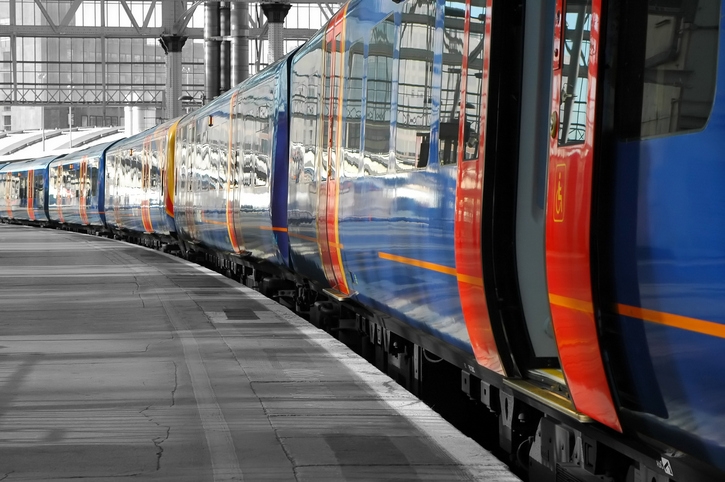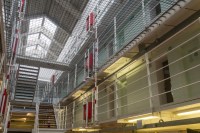Britain is a world leader in many things – but not many people would say that infrastructure is one of them. When abroad, Brits marvel at the state of airports and railways, even swimming pools. When we seek to catch up – with HS2 or a new runway for London – the result is years of wrangling. Is there a British curse? The Spectator gathered a group of industry leaders, policymakers and politicians in its boardroom to discuss. The lunch was sponsored by Aecom.
Fraser Nelson started by laying out the problem. The OECD recently found that the UK has underspent ‘over the past three decades’ and added that quality of infrastructure is the worst in the G7. A recent PwC report referred to the infrastructure gap as ‘the single biggest challenge facing the country today, with the possible exception of the Brexit negotiations’. So what’s to be done?
The business voices around the table said there is no shortage of money, but the problem is a means of investing it. Kwasi Kwarteng said the Heathrow expansion is a case study in what’s going wrong. The Blair government begins considering the need for it in mid-2001, with both the Tories and Lib Dems opposing the plans, eventually scrapped by David Cameron in 2010. Cameron later felt guilty and commissioned a review, so he could then be seen to be following the will of an external committee. But even now with parliament having voted for a third runway there’s legal action being prepared against the decision – led by London mayor Sadiq Khan. ‘It’s like the theological debates they used to have at medieval universities,’ says Kwarteng. ‘The have been no new facts or ideas brought into the Heathrow debate. It’s just an endless circle.’
Part of the problem is one that all democracies will face. Sir Mark Walport, Chief Executive of UK Research and Innovation, said: ‘with infrastructure, it’s always “your gain my pain”’. So disgruntled voices will seek politicians to represent them. Sir John Armitt, Chair of the National Infrastructure Commission, said this the realpolitik. ‘Democracy is expensive in that sense, but we are prepared as a society to accept that. We don’t want a dictatorship.’
But the G7 members are all democracies, all with better infrastructure than Britain according to the OECD. How do they deal with these problems? What’s their secret? Part of it is bribery. ‘The French are the great example of compensation. If you live near a nuclear power station, you get free energy for life’, says Kwasi Kwarteng. What’s more, monetary compensation schemes are paid up front. ‘Unlike in the UK, where you won’t be compensated until after’, says Sir John.
There’s also another British disease: cost inflation. Christian Wolmar, veteran transport journalist, points out the ever-increasing bill of HS2 on the accompanying podcast to the lunch discussion. ‘The predicted bill for HS2 at the moment is £55 billion for the whole 330 miles of line. But there are lots of quite reliable assessments that this is a great underestimation. This will likely cost a hundred billion or considerably more. Therein lies the problem. We’re not very good at building infrastructure at any kind of reasonable cost. At what price does it become just unacceptable to spend that kind of money? Because maybe it’s worth it at £50 billion, but is it worth it at £100 billion?’
Julia Prescot, Commissioner at the National Infrastructure Commission, said it could be done with enough discipline. ‘We have delivered upwards of £55bn of new greenfield infrastructure. Now within that, yes there have been contractual overruns, but they have not actually impacted. They are very minor. And these projects were delivered on time and within budget. It’s not impossible. Why is that? It’s because there is very clear project definition. People – particularly financiers – stick to what they’re asked to do in the first place.’
David Barwell, UK head of Aecom, also pointed out that we could be smarter in our approach. HS2, for instance, could be used for other purposes. ‘You could use it as a very modern, high technology utility corridor. Putting cables down there for high speed internet, [or] high voltage electricity… But also by having that sort of technology in the corridor future-proofs it to potentially other forms of transportation that might occur over that time… We can’t go around digging up the country every time we want to use some kind of new technology, so let’s use these corridors as longer-term corridors that could keep us going for more than a hundred years.’
The upsides are pretty big. The Centre for Cities recently estimated that the UK economy would be more than £200bn bigger if all cities were as productive as those in London and the southeast. And where progress is made, it can be quite effective. The Skytrax airport league table has Heathrow as number 8, with its Terminal 2 ranked as the finest terminal anywhere. Heathrow Express also works well, but took ages to build and, at £22 for a £20 minute journey, is rather expensive.
But will anything change? Sir John Armitt doesn’t give much hope: ‘if you were a Victorian investor in railways, talking to an engineer delivering these projects, the one thing you can be guaranteed is that these things will cost a lot more than they tell you. The nature of these things hasn’t changed.’
He also noted that the general shift of government direction has been towards abolishing toll charges, which he said is worrying as is makes private investment less likely. ‘Bridges are easy because you’ve got a captive audience. So there’s no problem in financing a bridge. I was chair of the second Severn crossing, and the day we took it over, we bumped the fares up massively on the old bridge before we’d even built the new one, because we had to start recovering the revenue. And the second Severn bridge the government has now decided to make free – big mistake as far as I’m concerned. Who’s going to pay the maintenance?’ Money will come if there is a viable means of recovering the investment. But a political environment that is suspicious about market mechanisms is one that’s less likely to untap the investment that so many people around the table said would be waiting.







Comments